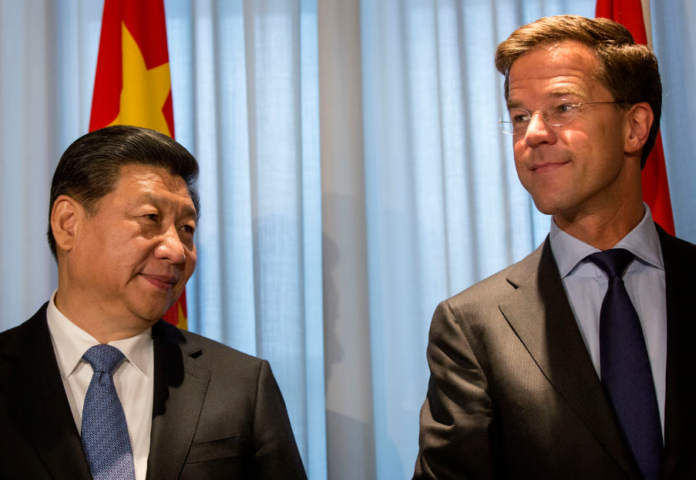Chinese leader Xi Jinping told visiting Dutch Prime Minister Mark Rutte on Wednesday that attempts to restrict China’s access to technology will not stop the country’s advance, according to AP News.
The Netherlands imposed export licensing requirements in 2023 on the sale of machinery that can make advanced processor chips. The move came after the United States blocked Chinese access to advanced chips and the equipment to make them, citing security concerns, and urged its allies to follow suit.
An online report from state broadcaster CCTV did not mention the chip machinery, but quoted Xi as saying that the creation of scientific and technological barriers and the fragmentation of the industrial and supply chains will lead to division and confrontation.
“The Chinese people also have the right to legitimate development, and no force can stop the pace of China’s scientific and technological development and progress,” Xi said, according to CCTV.
Rutte and Trade Minister Van Leeuwen were also expected to discuss the wars in Ukraine and Gaza during meetings with Xi and Chinese Premier Li Qiang, a Dutch government release said ahead of their trip.
China has taken a neutral position on the Ukraine war, providing Russia with diplomatic cover and economic support through trade. That stance has angered and frustrated much of Europe, which sees Russia as the aggressor and Ukraine as the victim, AP News reports.
“I’m going to try to convey how important it is for the Netherlands, for our security, that Russia does not win this, that Russia loses, and that we also ask a good friend like China to understand that,” Rutte said in a video message recorded on a street in a historic tourist district in Beijing.
In the video, posted on X, he also said that he would bring up intellectual property rights, subsidies and human rights.
Dutch company ASML is the world’s only producer of machines that use extreme ultraviolet lithography to make advanced semiconductors. In 2023, China became ASML’s second-largest market, accounting for 29% of its revenue as Chinese companies bought up equipment before the licensing requirement took effect.
Pressure from the US government pushed the Netherlands last summer to announce plans to prohibit ASML, from shipping some of its lithography machines to China. That came years after ASML was prohibited from selling its most-advanced equipment to the Asian nation, according to Bloomberg.
Beijing has repeatedly accused the US of trying to hold back China’s economic development by restricting access to technology. In response, Xi has launched a campaign to develop home-grown chips and other high-tech products.
“China always opposes the US overstretching the concept of national security and making various excuses to coerce other countries into imposing a technological blockade against China,” Foreign Ministry spokesperson Wang Wenbin said in January.
ASML, the Netherlands’ largest company, recently threatened to leave the country over anti-immigration policies that may impact the company’s ability to hire talent, leaving government officials scrambling to ensure that the firm does not leave.
The Hague has responded coolly to Washington’s latest push as the Dutch have been navigating a middle ground between the US and China in the escalating battle over the world’s chip supply chain. China is one of the Netherlands’ biggest trading partners.
Stuck in the middle of the growing political tensions, ASML’s boss Peter Wennink has been pushing back against the limits on his company’s business in China. The Dutch company recently reported significant pickup of revenue from China before the new curbs kicked in this year, Bloomberg reports.
The relations between China and the Netherlands have also been strained due to a slew of espionage incidents. Earlier this year, the Dutch intelligence agency said it uncovered an attempt backed by the Chinese state to use malware to spy on a computer network used by the country’s armed forces. Last year, ASML accused a former China-based employee of stealing confidential information.


